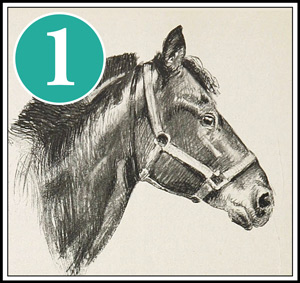
The Old Jim Horse
Episode 1 •
The Old Jim Horse
• The firemen all knew that the old Jim horse was going blind. But what of that? There wasn’t a horse in the service that knew the business so well as Jim.
Podcast: Play in new window | Download
Subscribe: Apple Podcasts | Email | TuneIn | RSS

SHOW NOTES
The Old Jim Horse
By J. Lincoln Steffens
McClure’s, May 1900
The Superintendent of Horses in the New York Fire Department sent a substitute to Thirty-three engine one day a year or two ago, and took away a big roan horse which had served there for eighteen years and nine months. “Horse registered No. 60, unfit,” is the way this act was reported officially. But the men, passing the news around the house, and thence from company to company all over town, said:
“They’ve taken the old Jim horse. They’re going to sell Thirty-three’s old Jim.”
Now the firemen all knew that the old Jim horse was unfit for duty. Captain Nash, the foreman of Thirty-three, had been watching secretly for two or three years the growth of a film over the animal’s big, intelligent eyes. No expert superintendent of fire horses was needed to see that Jim was going blind. But what of that? There wasn’t a horse in the service that knew the business so well as Jim. There wasn’t a fireman who loved a big fire more than the roan that ran in the middle of Thirty-three’s team of three.
“He learned what he had to do in five minutes after he was bought and delivered here,” said Captain Nash. “He caught on the first time they showed him. We never locked him in a stall. It wasn’t necessary; for he never left it without permission, except to get a drink or to respond to an alarm of fire. At the first tap of the gong, he sprang forward to his place.
Sometimes he came so fast that he had to slide to stop himself under the harness ; and when we let him out in the street to wander around, he’d run at the call of the gong, stop on the side walk, turn about, and back into his place at the pole. Why, we used to put boxes and chairs in his way from the stall, but he jumped over them and would still be first in the collar. They oughtn’t to have condemned Jim. He never cost the city a cent for doctor’s bills. Once he fell down on the way to a fire and was dragged a block over the Broadway cobbles; but he got up without our stopping, and though he was pretty sore, we never reported him, and he got over it. Sometimes a hose would burst, but Jim didn’t care if only he could turn his head out of the way. Many a shower of falling glass be has stood without flinching, as the scars on his back show, but he was never laid off a day. Half a dozen horses that were mated to him have lived their day and died, trying to pull up even with old Jim. It isn’t so long ago they sent us up a spare horse to take the place of one of Jim’s mates that was off being shod. There was one run, and Jim chewed the young horse’s neck to make him keep up his end, afraid we’d lose first water. He was a great fire horse, was Jim. The only trouble he gave was at meal times, which he knew like a clock ; and if his feed wasn’t set down before him on the minute, he made a fuss, pawing at the side of his stall and starting all the other horses to kicking.”
Possibly Captain Nash was prejudiced. He and Jim had served together in the same house for eleven years. But if there was anything so very wrong in concealing Jim’s aging weaknesses, the captain was not the only one to blame. Hugh Bonner, the Chief of the Department, had his down-town quarters in Thirty-three’s house, and he knew all about Jim, and all about Captain Nash, too, for that matter. Yet he kept mum. Then there was the Superintendent of Horses: why didn’t he do something before ? It is true he
had condemned Jim five years ago. This, however, is the way he did it. After inspecting the horse, he walked up to the captain and said:
“Nash, the old Jim horse is getting unfit. I guess I’ll have to send you a substitute.”
Captain Nash did not say anything. The substitute came, and he accepted the new horse, but he didn’t send Jim away. He handed over another horse. Now the stableman did not know the difference, perhaps, but the Superintendent did. He must have found that he had been fooled; and the captain, liable to punishment for disobeying orders, worried for a week. But nothing came of it. Possibly the Superintendent reported the case to the Chief. If he did, it is curious the Chief never mentioned the matter to Captain Nash. At any rate, the Chief must have known that the Jim horse had been condemned, and he certainly saw the Jim horse afterwards first at many a fire.
A year or two later, the Superintendent condemned Jim again, and he did it rather sharply this time. He did not say, “Nash, the old Jim horse,” and so on. He commanded Captain Nash to deliver “registered horse No. 60;” but after he was out of the door, he paused, turned half around, and said:
“He isn’t fit to run to fires, Nash. You better trade him off to me for a good, strong, young horse. Anyhow, I’m going to do my duty, and if you want–”
The rest was nothing but a grumble which no one could be expected to understand. The new horse arrived. The captain hesitated, till at last he thumped on his desk, and shouted down to the man on watch to transfer to the training stables the worst horse in the house. The fireman who received the order grinned, and delivered the next to the oldest horse, an animal that “never was no good, nohow.” And when the trampling of the departing hoofs had died away, the men up-stairs who heard the order stopped the game of cards while one of them went below. He walked around the engine to Jim’s stall, told him to get back, though the horse was not more than half a foot over the line, then returned to the game. He did not report anything verbally, but the others looked in his face, and resumed the play in great good humor. Just as they were forgetting the incident, the captain came out of his room and passed down stairs. He had to get something out of the feed-room, which is back of the horses. Old Jim tried to attract the captain’s attention, but the captain wouldn’t notice him.
The third time the Superintendent acted, he did not give the captain a chance for any of his tricky horse-trading. He had “registered horse No. 60” removed without talking about it, and Captain Nash was at a loss.
“I knew what it meant,” said the captain afterwards. “We had a horse here once, the Buck horse. He was a good fire horse, too; nothing like Jim, but he served faithful for years, and then went lame in his off hind leg. We did what we could for him till the inspector got onto it and took him away and sold him at auction. About a year after that, when we were all standing out in front of the house one day, an old, broken-down, lame horse came along the street, pulling one of those carts that go around collecting clam-shells. He balked right opposite the door. We thought at first he was tired, and I guess he was. Maybe some of the younger firemen laughed when the crazy old driver licked his horse. But all of a sudden we took notice of the horse’s sore leg, and somebody said: “‘It’s the old Buck horse, boys.'” And it was. He had stopped because he wanted to come in home, the old Buck horse did. And his leg was worse.”
So Captain Nash remembered the Buck horse when they took away the Jim horse. He waited till the Chief came to the house.
Then he told him. “Chief,” he said, “they’ve come and got the old Jim horse at last.”
The Chief did not answer.
“I’d just as lief keep him, Chief,” the captain continued. “He’s the best horse I had. A little film over his eyes, and pretty old, but he’s—he’s the old Jim horse, Chief.”
Another pause.
“They’ll sell him into some old ash-cart or to a Polish peddler. And Jim’s served long enough to have a pension.”
Then the Chief answered: “Why don’t you write his record up to the Board? I’ll endorse it.”
“I ain’t much on the write,” said Nash, “but I’ll try it, if you say so.” That was on a Saturday. Captain Nash took Sunday for the job, and here is his formal report to the Board of Fire Commissioners:
“I respectfully forward a brief history of the roan team of horses formerly used in the engine of this company. Of the original Jack horse I have not much to write, he being killed while responding to an alarm for fire at station 236 on May 30, 1881, by colliding with the shaft of Engine 13 tender. The point of the shaft entered his breast. … As to the horse Jim, who was received at these quarters on January 14, 1879, and performed duty therein until November 4, 1897, a period of eighteen years and nine months, the first eleven years of which Jim and his mate had to draw a heavy first-class engine, when the runs were more frequent and much longer than those of the present day, when the same identical engine is drawn by three horses. The Jim horse, in the opinion of all the officers and members ever connected with this company, and the many distinguished persons who visited these quarters, was such that they expressed the belief that there never was a horse that showed more intelligence than the Jim horse.”
Here followed a recital of Jim’s distinguishing traits in much the same language as that already quoted from Captain Nash. Chief Bonner wrote something, too:
“I take great pleasure in transmitting for your consideration the history of the Jim horse of Engine 33, for a period of nearly twenty years. … He was about seven years old when purchased, which would make him nearly twenty-seven years of age. I appeal to the Board in behalf of this faithful animal, that he be retained in the service of the department, and assigned to some company where the duties will be light, and that the Superintendent of Horses be directed to not include in his sale registered No. 60, which is the number assigned to this faithful animal.”
“This worked,” said the captain. When these communications were read at the Board meeting, the commissioners were silent a moment. Then the president said that he thought Jim had earned his pension and should be retired. No one objected; so the Superintendent of Horses was directed to keep Jim for such light work as might turn up, if there was any such. At any rate, he was not to be sold. This was the first time in the history of the department that a horse was retired like a fireman; but it paid. For example, it put a stop to Captain Nash’s grumbling about the new middle horse that runs now with Thirty-three engine.
To read more by Lincoln Steffens, check out The Overworked President.
• • • • • • • • • • • • • • • • • • • • • • • • • • • • • •
By subscribing, you will automatically receive the latest episodes downloaded to your computer or portable device. Select your preferred subscription method above.
To subscribe via a different application: Go to your favorite podcast application or news reader and enter this URL: https://clearwaterpress.com/byline/feed/podcast/
Comments are closed.

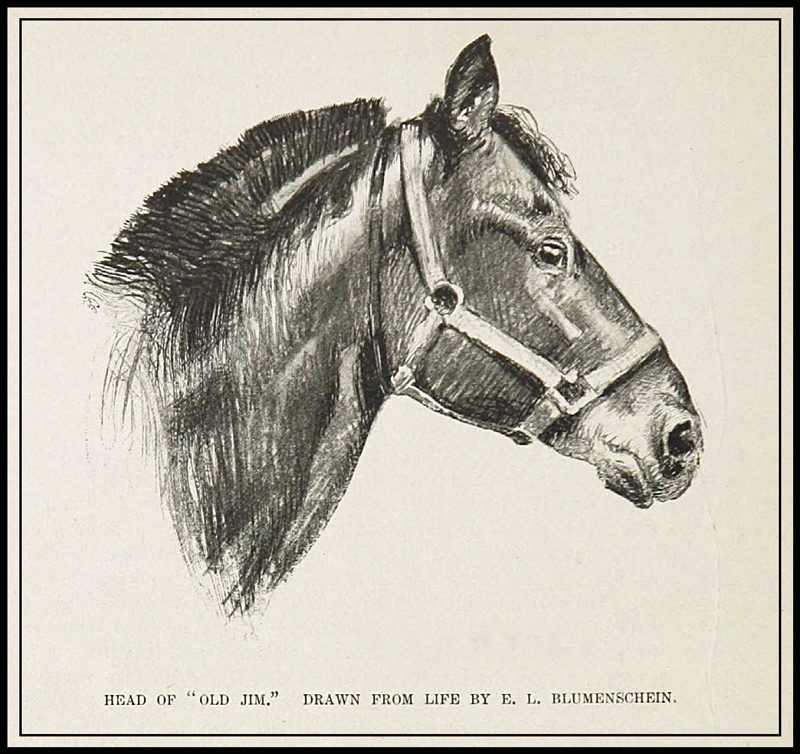
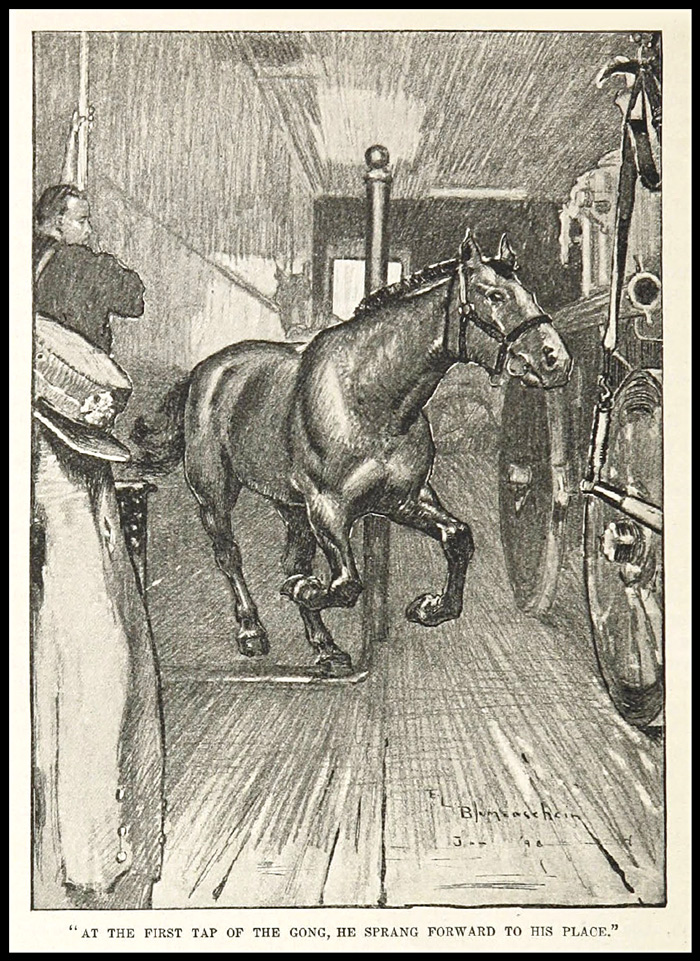
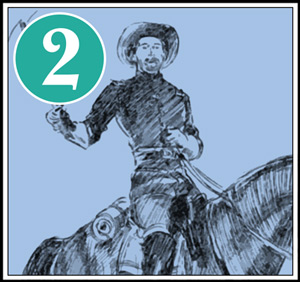
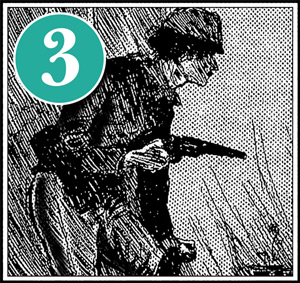
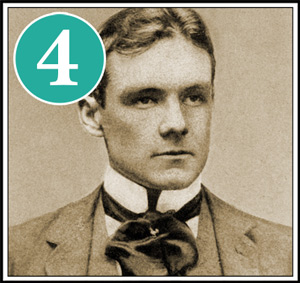
I’ve never really thought about the stories of firemen like this before! I’ve seen old pictures or sketches of horses pulling fire engines, but this brought such a colorful perspective. Bringing history back to life like this is so amazing! I’m more of a visual and auditory learner, so being able to hear Mr. S read the story and see the sketches really helped me internalize this story.